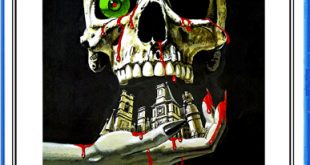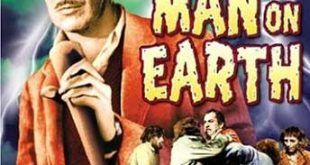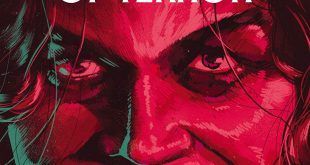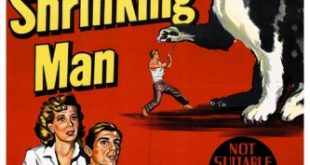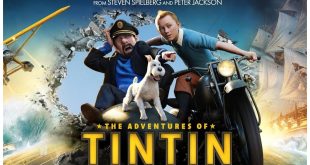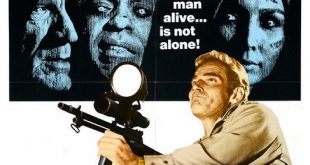 SYNOPSIS:
SYNOPSIS:
“David Mann is feeling emasculated in his life, especially after a fight with his wife the evening before. While driving to a business appointment along a two-lane relatively secluded highway in the California desert, David, innocently he believes, passes an eighteen-wheel fuel truck. Later, the truck comes across him again, playing games of road chicken. David initially thinks that the truck driver is just a bad driver. Then, he believes the truck driver is an idiot. Finally, David comes to the realization that the truck driver is out to terrorize/kill him on the road. Feeling a little worse for wear, David thinks that he’s eluded his unseen assailant when he almost crashes at a truck stop. However, when he is about ready to leave the truck stop, the eighteen wheeler is there waiting for him. With no friends or proof to back his story, David, knowing that he cannot outrun the souped up truck, has to decide how best to save himself.” (courtesy IMDB)
REVIEW:
In these days of multi-million dollar flops and rumours of the imminent decline and fall of Hollywood, Steven Spielberg is sometimes mentioned as a saviour of the film industry. While others turn out monumental turkeys, almost everything Spielberg touches breaks all previous box office records. From 1975 to 1985 he directed and/or produced eighteen films, including eight of the highest-grossing motion pictures of all-time: Jaws (1975), Close Encounters Of The Third Kind (1977), Raiders Of The Lost Ark (1981), E.T. The Extra-Terrestrial (1982), Poltergeist (1982), Gremlins (1984), Indiana Jones And The Temple Of Doom (1984) and Back To The Future (1985). He’s had his flops too, and yet he’s been hailed as a latter-day Disney, another Thalberg, a Goldwyn who can talk straight. Actually, he’s more like the Ronald McDonald of movies, a chap who’s able to take the same old basic ingredients and make them palatable to an enormous number of people.
 Spielberg’s name came to public notice in a modest way with his first feature Duel (1971) which was made for American television and broadcast in November 1971. It was not his first professional work, however. He had tried to enter the film school at the University of Southern California on the basis of amateur movies he had made, including his two-hour-long science fiction film Firelight. He failed. They had accepted George Lucas, John Milius, and were about to accept John Carpenter, but they would not take young Spielberg. But eventually, at the age of 21, after haunting the lot at Universal Studios and making a 35mm documentary about hitchhiking called Amblin’ he was given a job as one of three directors making a television pilot for a new series called Night Gallery.
Spielberg’s name came to public notice in a modest way with his first feature Duel (1971) which was made for American television and broadcast in November 1971. It was not his first professional work, however. He had tried to enter the film school at the University of Southern California on the basis of amateur movies he had made, including his two-hour-long science fiction film Firelight. He failed. They had accepted George Lucas, John Milius, and were about to accept John Carpenter, but they would not take young Spielberg. But eventually, at the age of 21, after haunting the lot at Universal Studios and making a 35mm documentary about hitchhiking called Amblin’ he was given a job as one of three directors making a television pilot for a new series called Night Gallery.
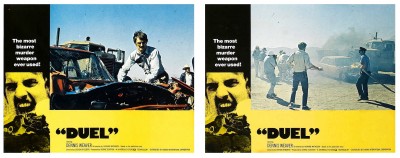 In 1971 he had seven separate episodes for various television series broadcast, but Duel – which was an actual full-length movie and not just an episode of something – was what caught people’s eyes. There was no immediate excitement – although Duel was well received by both critics and audiences alike, it was not until 1973 that it gained release as a cinema film in Europe and Australia with added footage, increasing its duration from 74 minutes to 90 minutes. That was when it started winning festival prizes and rave reviews, and suddenly Spielberg’s career really took off.
In 1971 he had seven separate episodes for various television series broadcast, but Duel – which was an actual full-length movie and not just an episode of something – was what caught people’s eyes. There was no immediate excitement – although Duel was well received by both critics and audiences alike, it was not until 1973 that it gained release as a cinema film in Europe and Australia with added footage, increasing its duration from 74 minutes to 90 minutes. That was when it started winning festival prizes and rave reviews, and suddenly Spielberg’s career really took off.
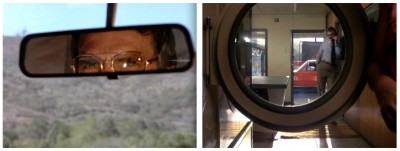 Duel is a text-book example of the Monster Movie – one of the best ever made – with a very unusual monster, a large rather decrepit-looking semi-trailer truck. The script was by Richard Matheson, based on his own short story originally published in Playboy magazine. Matheson was responsible for scripting a record number of unforgettable genre hits which include The Incredible Shrinking Man (1957), The House Of Usher (1960), The Pit And The Pendulum (1961), Burn Witch Burn (1962), Tales Of Terror (1962), The Raven (1963), Comedy Of Terrors (1963), The Devil Rides Out (1968), The Legend Of Hell House (1973), What Dreams May Come (1998), as well as made-for-television movies like Trilogy Of Terror (1975) and The Night Stalker (1972). Matheson also scripted sixteen immortal episodes of Rod Serling’s original Twilight Zone series and I’d bet at least a quarter of The Simpsons Treehouse Of Horror stories are inspired by Matheson’s writings!
Duel is a text-book example of the Monster Movie – one of the best ever made – with a very unusual monster, a large rather decrepit-looking semi-trailer truck. The script was by Richard Matheson, based on his own short story originally published in Playboy magazine. Matheson was responsible for scripting a record number of unforgettable genre hits which include The Incredible Shrinking Man (1957), The House Of Usher (1960), The Pit And The Pendulum (1961), Burn Witch Burn (1962), Tales Of Terror (1962), The Raven (1963), Comedy Of Terrors (1963), The Devil Rides Out (1968), The Legend Of Hell House (1973), What Dreams May Come (1998), as well as made-for-television movies like Trilogy Of Terror (1975) and The Night Stalker (1972). Matheson also scripted sixteen immortal episodes of Rod Serling’s original Twilight Zone series and I’d bet at least a quarter of The Simpsons Treehouse Of Horror stories are inspired by Matheson’s writings!
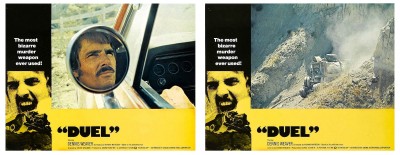 Dennis Weaver plays the man in Duel whose car is repeatedly attacked for no particular reason by a truck he has overtaken. It is definitely the truck that is the ‘monster’ and not its driver, who is never fully seen. It is the truck itself that seems malevolent, its headlights like the glowing eyes of some great dinosaur as it lurks in ambush, its engines like the growling of some vast beast. The film has virtually no dialogue, it is pure cinema brilliantly edited, about an ordinary man-in-the-street (like most of Spielberg’s heroes), being driven to the brink of madness by a violent attack out of no-where. The idea of horror erupting out of normality is basic to the Monster Movie, and it has rarely been done better. Even the ending has its own wonderful logic, when the truck finally leaps voraciously, not on Weaver but his car, and goes over a cliff in the attempt: In the one moment of overt horror, the truck utters a bellowing death-cry as it plunges to its doom.
Dennis Weaver plays the man in Duel whose car is repeatedly attacked for no particular reason by a truck he has overtaken. It is definitely the truck that is the ‘monster’ and not its driver, who is never fully seen. It is the truck itself that seems malevolent, its headlights like the glowing eyes of some great dinosaur as it lurks in ambush, its engines like the growling of some vast beast. The film has virtually no dialogue, it is pure cinema brilliantly edited, about an ordinary man-in-the-street (like most of Spielberg’s heroes), being driven to the brink of madness by a violent attack out of no-where. The idea of horror erupting out of normality is basic to the Monster Movie, and it has rarely been done better. Even the ending has its own wonderful logic, when the truck finally leaps voraciously, not on Weaver but his car, and goes over a cliff in the attempt: In the one moment of overt horror, the truck utters a bellowing death-cry as it plunges to its doom.
 Spielberg made two more feature-length movies for television: Something Evil (1972), about the possession of a young girl, and Savage (1973) was a run-of-the-mill private eye story. Both were competent, neither was extraordinary, and neither received cinema release. But after the overseas success of Duel, he was given a cinema feature to direct: Sugarland Express (1974) starring Goldie Hawn and William Atherton as the jailbird couple on the run in an effort to save their baby boy from being adopted. Well-made and sentimental, it quietly sank out of sight due to poor promotion. Next on Spielberg’s ‘To Do’ list was the box-office record-breaker Jaws (1975) and the rest, as they say, is history.
Spielberg made two more feature-length movies for television: Something Evil (1972), about the possession of a young girl, and Savage (1973) was a run-of-the-mill private eye story. Both were competent, neither was extraordinary, and neither received cinema release. But after the overseas success of Duel, he was given a cinema feature to direct: Sugarland Express (1974) starring Goldie Hawn and William Atherton as the jailbird couple on the run in an effort to save their baby boy from being adopted. Well-made and sentimental, it quietly sank out of sight due to poor promotion. Next on Spielberg’s ‘To Do’ list was the box-office record-breaker Jaws (1975) and the rest, as they say, is history.
 Spielberg’s biggest hits remain those that tell of unearthly wonders from a child’s point of view – like E.T. The Extra-Terrestrial – or at least from the point of view of the child within – like Jurassic Park (1993). When he tries to break out of this familiar formula, he is usually criticised for doing so. For instance, his first attempt at a non-fantastic film resulted in The Colour Purple (1985) which was accused of sanitising Alice Walker’s original novel and deemed a failure by many critics. But when Spielberg works within the formula, he has unparalleled success, and almost single-handedly given Hollywood’s special effects industry a huge boost. What with giant dinosaurs, alien visitors, temples of doom and the like, Duel is the least complicated film Spielberg would ever make, and it still plays powerfully today.
Spielberg’s biggest hits remain those that tell of unearthly wonders from a child’s point of view – like E.T. The Extra-Terrestrial – or at least from the point of view of the child within – like Jurassic Park (1993). When he tries to break out of this familiar formula, he is usually criticised for doing so. For instance, his first attempt at a non-fantastic film resulted in The Colour Purple (1985) which was accused of sanitising Alice Walker’s original novel and deemed a failure by many critics. But when Spielberg works within the formula, he has unparalleled success, and almost single-handedly given Hollywood’s special effects industry a huge boost. What with giant dinosaurs, alien visitors, temples of doom and the like, Duel is the least complicated film Spielberg would ever make, and it still plays powerfully today.
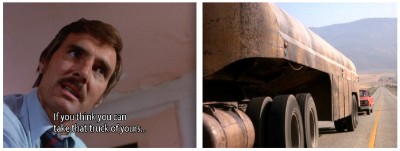 His undeniable technical expertise, allied with his instinct for mythologies that keep their power in a secular world, has already worked miracles both commercially and aesthetically. It would be no surprise at all if his future accomplishments were even greater than those in the past, for he is a thoughtful and talented filmmaker, and true to his own vision. It’s with this thought in mind I’ll ask you to please join me next week when I have the opportunity to burst your blood vessels with another terror-filled excursion to the back side of Hollywood for…Horror News! Toodles!
His undeniable technical expertise, allied with his instinct for mythologies that keep their power in a secular world, has already worked miracles both commercially and aesthetically. It would be no surprise at all if his future accomplishments were even greater than those in the past, for he is a thoughtful and talented filmmaker, and true to his own vision. It’s with this thought in mind I’ll ask you to please join me next week when I have the opportunity to burst your blood vessels with another terror-filled excursion to the back side of Hollywood for…Horror News! Toodles!
 Horror News | HNN Official Site | Horror Movies,Trailers, Reviews
Horror News | HNN Official Site | Horror Movies,Trailers, Reviews

